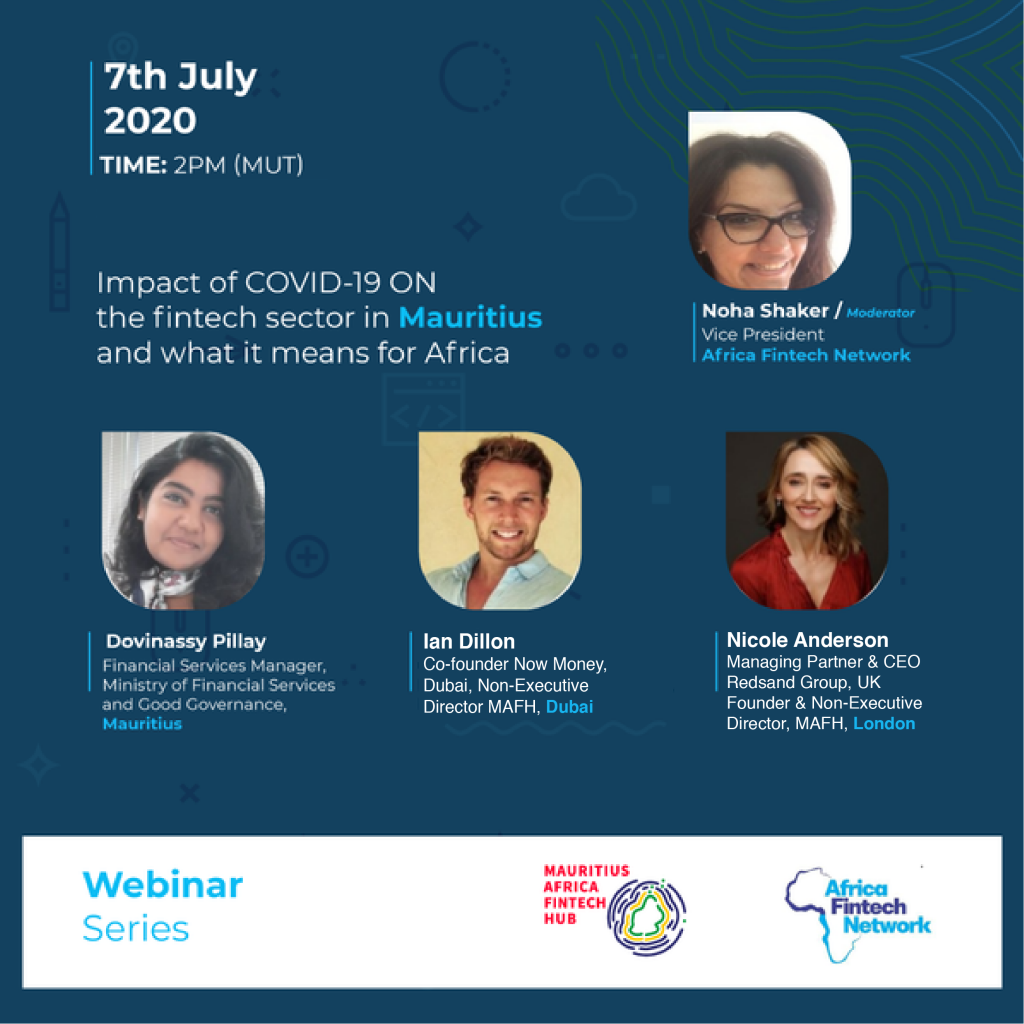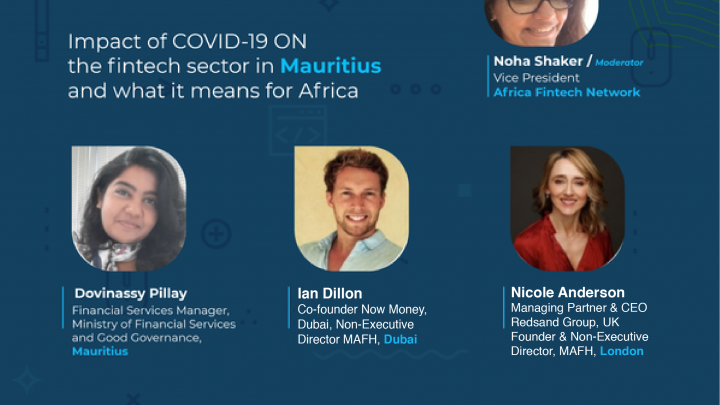As economies around the world continue to shift from “respond” to “recover”, COVID-19 may have created new opportunities for the FinTech space to produce new ways of providing value. On that note, the Africa Fintech Network (AFN) hosted a Thought Leadership Webinar in collaboration with the Mauritius Africa Fintech Hub (MAFH) via Zoom on July 7 on the theme “Impact of COVID-19 on the FinTech sector in Mauritius and what it means for Africa”.
This theme was debated by panelists Nicole Anderson, Managing Partner & CEO, Redsand Group, UK; Founder & Non-executive Director, MAFH; Ian Dillon, Co-founder, NOW Money, Dubai; Non-executive Director, MAFH; and Dovinassy Pillay, Financial Services Manager at the Ministry of Financial Services and Good Governance, Mauritius.

The session was moderated by Noha Shaker, the founder and Secretary General of the Egyptian Fintech Association and the elected Vice President of both the Africa FinTech Network and the union of African FinTech associations.
Speaking about the impact on entrepreneurs in the global FinTech landscape, Ian Dillon saw that the FinTech companies had been the winners, as “banks have realised that they cannot operate in the way that is required in 2020” since their culture is not supportive of rapid evolution. He noted that banks were now coming to FinTech companies and asking to partner with them in order to gain better mobile experience, digital apps, focus on better KYC, digital compliance and smoother transactions.
He considered that the partnership works well as it had become a collaborative process rather than a competitive one.
Regarding the impact on investment and capital in the African region, Nicole Anderson noted that, prior to the crisis, the technology and innovation landscape in Africa was seen to be making headway, fuelled by a torrent of venture capital in 2018/2019.
The year had seen a record level funding of USD 1.34 bn injected, the highest ever seen by the African ecosystem. In terms of future prospects post COVID-19, she saw that investors would be holding themselves accountable as to whether the activities of a particular FinTech company were really impactful. On the regulatory side, she saw that “FinTech has to gain the confidence of the regulators and the market it serves”. She highlighted that “financial inclusion is still at the top of the agenda”, while infrastructure remained a key area for innovation.
Commenting on policy and regulation in Mauritius, Dovinassy Pillay, placed this in the context of the increasing adaptability of the banking sector, adoption of e-commerce transactions, resilience of the Financial Services sector, and accelerating innovation.
She said: “Covid-19 has been a big eye-opener regarding FinTech”. She explained that, for example, documents for account opening have been sent via WhatsApp. She explained that is needed is for FinTech start-ups to tap into the potential and understand the impact of the measures. She noted that “these measures already exist, but it is the way that it has been facilitated that has to be changed.”
Dovinassy considered that these measures can be adopted by other countries in the region, and that Mauritius could form partnerships. She noted that in Mauritius there is a central KYC database “so we can see African companies discover the merit in opening an account with the Bank of Mauritius. For Africa, it would mean that we have better financial inclusion, literacy and ever-growing opportunities for the innovators and start-ups.”
On a concluding note, President of the AFN, Dr Segun Aina stated: “We should be fast tracking digital transformation in a post COVID scenario and should be interested in understanding how
FinTechs can leverage on the US$50 bn support that the World Bank is extending to the FinTech sector in Africa. At AFN, we have 32 countries as members and are keen to get all the 54 countries in Africa on board by next year. Our aim is to have great FinTech solutions coming out of Africa that can be used across the globe. We will ensure that these sessions continue regularly so that we can understand the impact of COVID-19 across African jurisdictions and I look forward to all of you joining again for the next country session.”





